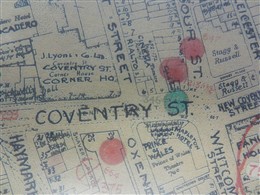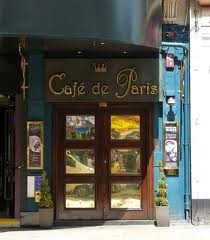Cafe de Paris

Bomb Map: Cafe de Paris, Coventry Street W1
Copyright Westminster City Archives

The Cafe de Paris entrance today
Patrick Collins
Cafe de Paris, Coventry Street W1
8 March 1941
By Patrick Collins, Raquel Burchett and Peter Daniel
The Café de Paris on Coventry Street W1 was one of the most popular places for well-heeled Londoners to relax at night during the Blitz. This was not only because the venue was a night club and restaurant offering different types of live music, including blues and jazz. At twenty feet below ground it was considered the “safest and gayest restaurant in town".
Very few night clubs were given a licence to operate by Westminster Council during the Blitz because of the strict blackout regulations. But officials believed the Cafe de Paris to be safe as it was felt that light would not escape from underground.
The Cafe de Paris - opened in 1924 with an luxurious interior modelled on the White Star liner Titanc - became a place of escape, particuarly for army officers and RAF aircrews based in or around London who would race up to the West End to live their often short lives to the full. During this time of incredible fear people needed a sense of normalcy and a place where they could forget about the horrors of war. For those who could afford it this place was the Café de Paris.
The night the Café de Paris was hit, Saturday 8 March 1941, it was crowded with dancers and diners in full evening dress. Most of them felt as safe as if they were in the local air raid shelters. That March night, even though a heavy raid (130 tons of high explosive and 30,000 incendiaries) was taking place on London, those in the club were determined to enjoy the music. This was being provided by West Indian-born swing band leader Ken Johnson, known as 'Snakehips' because of his fluent dancing style. His band had just launched into the opening bars of the Andrews Sisters' hit, Oh, Johnny, Oh, Johnny, Oh! and the dance floor was packed. Then came a blinding blue flash. Two 110lb (50kg) bombs had struck the Rialto Cinema above the club. They punched though the building and hurtled downwards. One exploded on the gallery above the band. The second hit the dance floor but failed to explode.
'Snakehips' and most of his orchestra, together with restaurateur M. Poulsen and the Club's Head Waiter, were killed outright. Furniture, instrument cases and stage decorations were hurled in all directions. Flying fragments of wine bottles and glass were responsible for many injuries. Sheet music fluttered though clouds of dust. It was a nightmarish scene. The injuries sustained by the revellers were horrific and for obvious reasons were not reported at the time. The blast, contained by the club's compact interior, killed diners at their tables instantly. Evening dress was ripped from the bodies of the dead by the force of the blast.
The bombs devastated the heart of the Café de Paris, demolishing the staircase leading from the balcony to the dance floor and tearing all of the decorations away from the ceiling. Those that survived struggled to make their way back to ground level through the piles of furniture that blocked the exits. Dozens of victims made it to the street bleeding from cuts or carrying the corpses of others.
Those who were trapped inside owed a debt of thanks to Albert Weaver, a manager of the Mapleton Hotel, which stood opposite the club. Soon after the first bomb detonated, he went straight across to the Café de Paris with torches in order to bring out the injured. Mapleton residents and staff helped carry the injured into the hotel and dressed their wounds before nurses and ambulances arrived.
The initial emergency response to the Cafe de Paris incident was seriously flawed. A message sent from the scene to the Westminster Control Centre was misinterpreted. Although two Heavy Rescue parties, a Mobile Aid post, two stretcher parties and two ambulances were soon on their way to Coventry Street, the urgent need for more ambulances and stretcher parties was underestimated. It would be over an hour before enough ambulances arrived. The survivors were obliged to commandeer taxis to take some of the injured to hospital.
Rescuers were confronted by a macabre vista of mangled corpses. Other victims killed by blast appeared eerily untouched. The hotel workers improvised, using champagne to clean wounds. Women tore up their fine evening gowns to use as tourniquets. Some of the escapes were miraculous. The Cafe de Paris' troupe of ten glamorous dancers - due on stage when the bombs struck - were all uninjured. They were waiting in the wings and protected from the blast.
Determined to show the "Blitz Spirit", some survivors from the Café de Paris went off to other West End restaurants and clubs to complete their evening's revels. In sad contrast looters took advantage of the chaos. It was reported that some cut off the fingers of the dead to steal their rings. Nevertheless, even among such terrible scenes, one man kept a sense of gallows humour. Carried out on a stretcher, he got a cheer from bystanders when he reputedly called out, 'At least I didn't have to pay for dinner.'
City of Westminster ARP declared the incident closed at 11pm
At least 34 staff, band members and patrons were killed in the Cafe de Paris incident, one of the most infamous stories of the London Blitz. Between 80 and 100 others suffered serious or minor injuries, including the daughter of the former Conservative Prime Minister Stanley Baldwin. Requests for information on the victims were still being received a month later. Press reports downplayed the Cafe de Paris incident for two weeks, merely describing it as bomb damage to 'a London restaurant'. One of the policemen who responded to the incident was Ballard Berkeley, a Special Constable in the Blitz later famous for playing crusty 'Major Gowen' in the classic 1970's BBC television comedy Fawlty Towers.